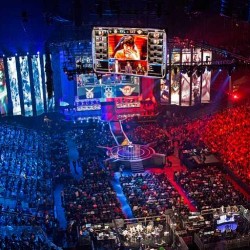The Future of eSports Betting in the USA

eSports betting, in which people wager on the outcome of video games, is one of the gambling industry’s fastest growing sectors, with the market expected to grow to $952 million by the year 2019. This would represent a 375 percent increase compared to where it was in 2014, with many analysts expecting it to be a billion dollar industry by 2020.
Asia Driving Force Behind eSports
eSports first came to prominence in the 1990s, as video gaming competitions started being organized which offered huge prizes. Tournaments which pitted players against one another across games such as Quake, Halo, and Counter Strike soon began to attract large crowds, with their numbers only swelling after Warcraft, Starcraft, and numerous other games were added to the products available.
The cash prizes offered by eSports tournaments may have been nominal back in 1998, but these days the prize pools of games such as DOTA, Counter Strike, and Starcraft swell into the tens of millions of dollars. Initially leading the way in terms of popularity were Asian countries such as South Korea and Japan, but since these markets have reached a peak, other Asian countries including China, Malaysia, and Singapore have continued to drive the eSports market forward.
Sports Betting to Help Drive eSports
While the rest of the world embrace eSports betting, such activities continue to be illegal in every state in the United States. Optimistically, some international websites already have the base framework in place to accept bets from U.S. players in the future, but for now, no state has taken steps to legalize this type of betting. In the meantime, Americans are believed to be spending up to $3 billion in illegal offshore sports betting each year, and there is a good reason to think that at least some of that revenue is now going toward the ultra popular niche of eSports betting.
Many believe that the U.S. will soon allow for legal eSports betting at least in some areas, with some industry insiders even believing that it will happen within the next 2 years. At the recent Global Gaming Expo 2016, eSports was a major focus, so it’s clear that betting on the events is on the radar of big names in the U.S. gambling industry. In fact, major players in the world of gambling are already using their influence to encourage lawmakers to begin regulating eSports betting, and as Geoff Freeman, President of the American Gaming Association (AGA), commented recently:
“Daily fantasy sports was the topic last year, a little bit of eSports this year. But the broader issue of sports betting is the constant. I really feel good about the direction of that. The tide is turning pretty quickly,” Freeman told CalvinAyre.com “We are making headway. I think the prospects for legalization of sports betting are greater today than they have ever been.”
Challenges Ahead
Still, there are some obstacles that stand between would-be eSports bettors and legal gambling. Sports betting is banned in 46 of the 50 states, and New Jersey’s recent push to have the ban declared unconstitutional failed in appeals. The Unlawful Internet Gambling Enforcement Act (UIGEA) of 2006 poses another problem as this law makes many forms of online gambling illegal as well.
In order for legal eSports betting to become a reality, states will have to argue that eSports betting is not the same as sports betting in much the same way that the case has had to be made that daily fantasy sports amounts to more than just gambling on major sporting events. The only other road ahead will be for regulations at the federal level, though this seems unlikely, as up until this point, U.S. lawmakers seem content to leave matters of gambling in the hands of the state.
A two-year time frame for eSports betting regulation may be overly optimistic, but only time will tell if the promise of tax revenues from the booming business will encourage lawmakers to act quickly. In the meantime, Scott Burton, the founder of EsportsPools, warned against expecting a quick introduction in the US, stating:
“The thing we liked about esports is that it’s a truly global product. It’s all over the world. It fit well with us being a company that’s focused outside of North America.. From a US focus, we’ve kind of ignored it almost the whole life of this company. You can’t bet in the US online outside of Nevada. Sports betting legality still seems far away, and if it does come I think it’s going to be messy.”










